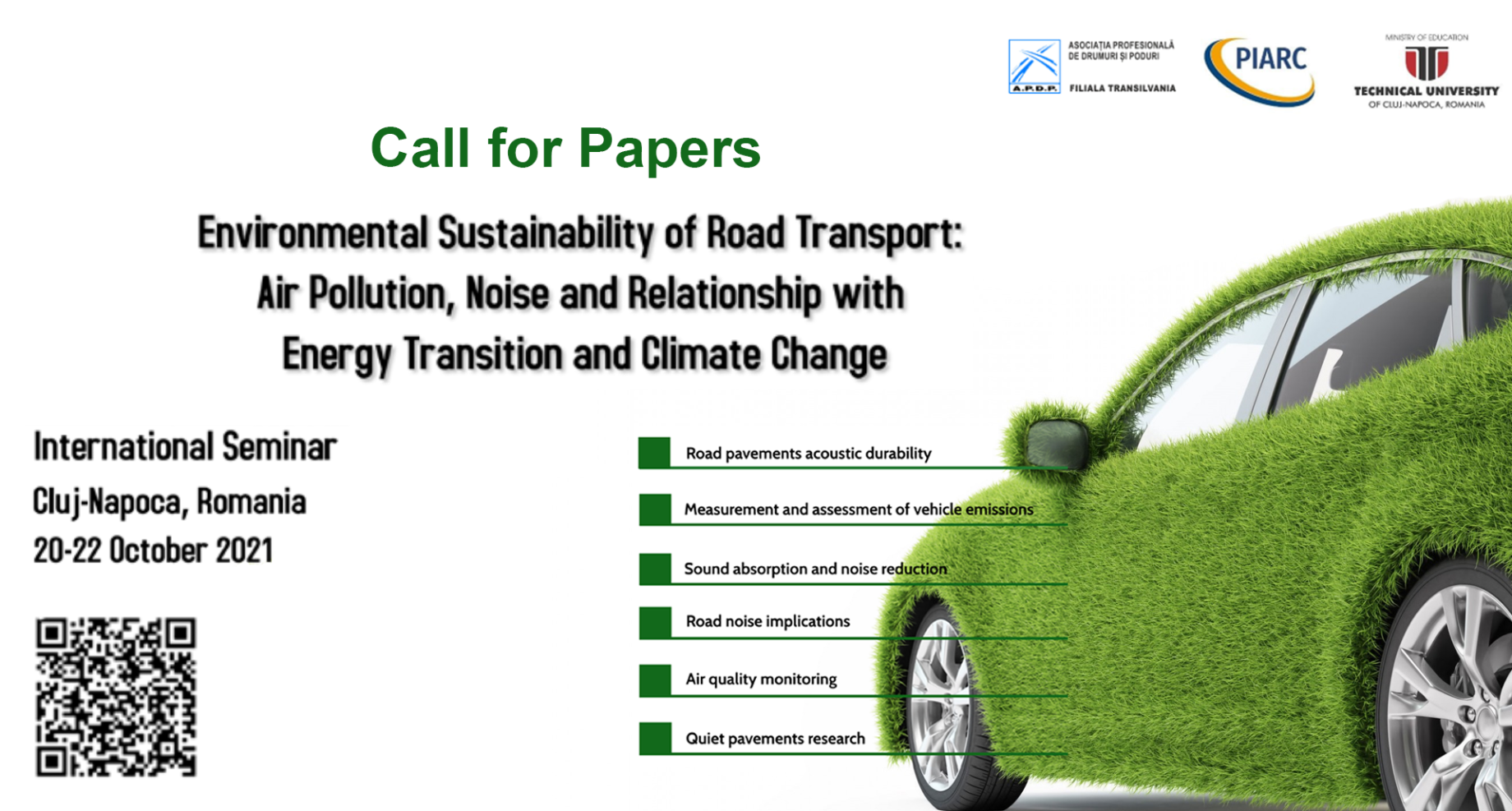Submit an abstract and share your knowledge in the Environmental Sustainability of Road Transport!
14 April 2021
Experts on Environmental Sustainability of Road Transport are invited to submit a 300-word abstract in Romanian or English before 16 May 2021 for the upcoming International Seminar “Environmental Sustainability of Road Transport: Air Pollution, Noise and Relationship with Energy Transition and Climate Change” in Cluj-Napoca, Romania, between 20 and 22 October 2021.
PIARC’s Technical Committee 3.4: Environmental Sustainability in Road Infrastructure and Transport, the Romanian National Committee of PIARC and the Department of Railways, Roads and Bridges of the Cluj-Napoca Technical University are organizing the ”Environmental Sustainability of Road Transport: Air Pollution, Noise and Relationship with Energy Transition and Climate Change” International Seminar. You are warmly invited to attend this event, which will take place in Cluj-Napoca, Romania, between 20 and 22 October 2021. Experts on the subjects also have the possibility to take part in the event and share their knowledge by submitting their abstract before 16 May 2021.
The seminar aims to provide an opportunity to share research findings, practices and experiences between designers, contractors, researchers, administrators and stakeholders. The measurement, assessment and mitigation measures in reducing emissions from traffic operations, along with the technical aspects of road pavements’ acoustic performance will be included in the seminar. Furthermore, issues regarding the challenges of traffic noise management, as well as the implications and consequences of traffic, materials and evolving vehicle fleets on climate change and energy transition will be discussed.
This event will also represent a valuable output for the wider objective of investigating and assessing how road administrations could help improve air quality through specific techniques, real time evaluation of air pollution, use of low-cost air quality sensors and implementing operational mitigation measures.
Topics
Professionals, academics and researchers from all countries are warmly invited to attend the seminar and submit papers on the following themes:
Real time measurement and assessment of vehicle emissions to assist in decision making for improving air quality with consideration of energy transition:
- different types, accuracy and applications of low-cost air quality sensors for real time data;
- examples and implications of real time monitoring traffic operations (by using low-cost sensors);
- real time control and traffic management strategies related to air pollution;
- implications of a changing vehicle fleet (longer term view): adapting what and how we measure;
- air quality impact of the Covid-19 pandemic;
- changes in traffic volume, composition of vehicle fleet and travel patterns due to the Covid-19 pandemic.
Road pavements acoustic durability with regard to sustainable development and climate change:
- methods, devices and criteria for pavement acoustic durability;
- measurements and prediction of noise;
- optimisation of acoustic parameters through improvements in pavement design, construction and maintenance;
- research and analysis of noise reduction with the use of low-noise pavements;
- sound absorption and noise reduction analysis;
- noise prediction using computer modelling;
- urban planning in the field of noise control;
- acoustical implications for sustainable development;
- energy transition assessment;
- noise barriers in the context of renewable energy;
- integration of GIS with noise measurements, models and prediction;
- noise maps and environmental protection programs against noise;
- measurement techniques, including applications on low-noise pavements;
- criteria for selecting solutions to reduce noise;
- traffic noise regulations and administrative policy requirements;
- road noise implications on CO2 emissions and climate change;
- impact of vehicle fleet changes on road noise;
- health, ecological and economic effects of road traffic noise;
- innovative materials;
- the transport sector of the Paris Agreement;
- influence of the road condition (technical state, cleanliness etc.) on noise.
About the abstracts
Abstracts should:
- be submitted in a Microsoft Word or Open Access document file;
- be written in English or Romanian;
- include the following: paper title, authors, affiliation, contact e-mail, abstract (max. 300 words). Abstracts should be sent as an attached file via e-mail to seminar_piarc@utcluj.ro
